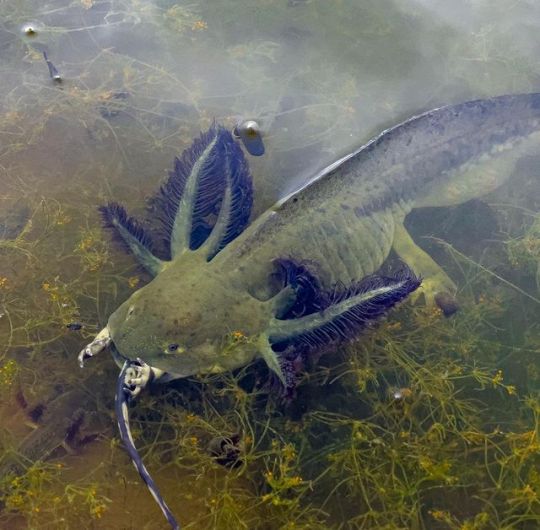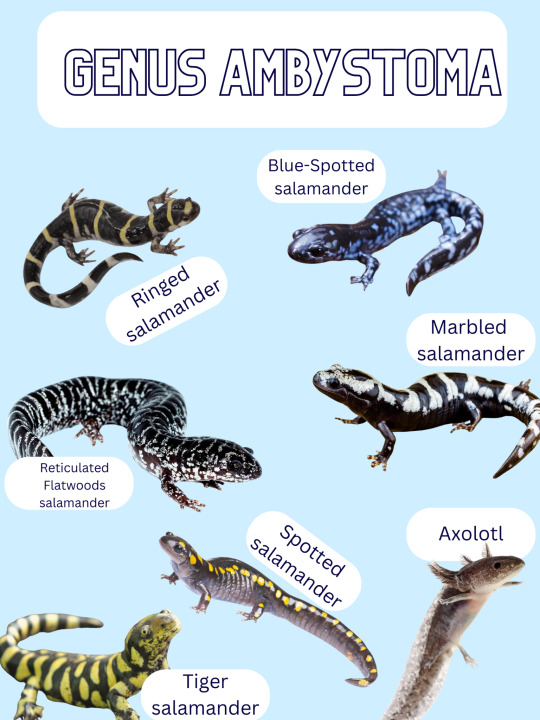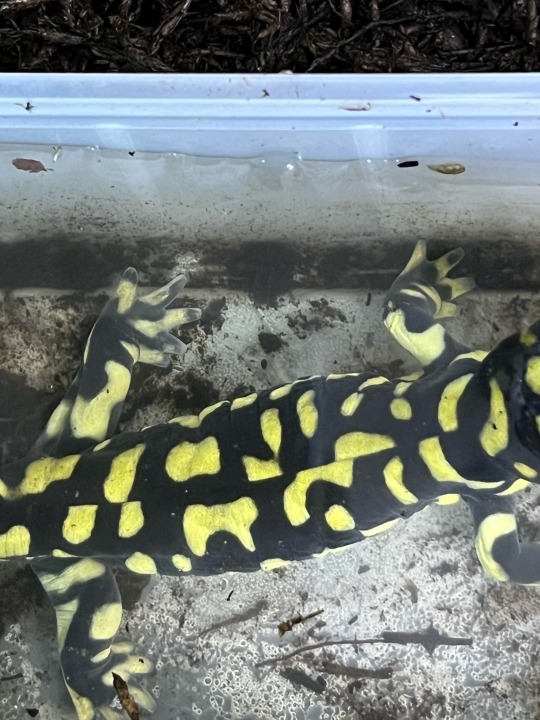#Ambystoma mavortium
Explore tagged Tumblr posts
Photo

Barred Tiger Salamander
#western tiger salamander#barred tiger salamander#salamander#Ambystoma mavortium#mole salamander#Amphibia#Urodela#Ambystomatidae#Ambystoma#upl
2K notes
·
View notes
Text

8 notes
·
View notes
Text



Barred Tiger Salamander (Ambystoma mavortium mavortium), larva/tadpole, family Ambystomatidae, West TX, USA
This is a subspecies of the Western Tiger Salamander.
photograph by John P Clare
#salamander#ambystoma#tiger salamander#ambystomatidae#amphibian#herpetology#animals#nature#north america
2K notes
·
View notes
Text
In your journey to cultivate yourself as a person, it is of utmost importance to choose your favorite species of mole salamander. You never know when someone will ask, as this question is a common ice-breaker in many social circles. If you don’t already have a favorite Ambystomid salamander in mind, feel free to select one of my favorites for your personal use.

#amphibuary#Ambystoma#polls#salamanders#shitpost#but not really#that’s my little guy representing the tigers 🥰
454 notes
·
View notes
Text

Somebody UVW unwrapped my tiger salamander wrong.
34 notes
·
View notes
Text
Not a new picture (the plants are more thickly grown in by now), but the variation in tiger salamander patterns is astounding. The ones on the left and the right (who has a dirty head) are the same species of tiger salamander from the same state even.

#amphiblr#salamander#reptiblr#amphibian#tiger salamander#ambystoma#ambystoma tigrinum#ambystoma mavortium
9 notes
·
View notes
Text










More doodles courtesy of my stats notes. Happy Halloween!👻 🎃
#drawing#doodles#notebook art#spooktober#halloween#dinosaur#salamander#fox#camel#manatee#ant on flower#ladybug#pidgeon#plains coreopsis#ambystoma mavortium
2 notes
·
View notes
Photo

#Arizona tiger salamander#Ambystoma mavortium nebulosum#Arizona - USA#(** also tumblr isn't working properly and some sources no longer appear)#(so some will have to be embedded through the image itself)
5K notes
·
View notes
Text
How does Nature Heal itself?
How does Nature Heal itself?
One vital difference between the things humans make and the things the rest of nature makes is that when something breaks, manmade things can occasionally be fixed and glued together but overall things do not fix themselves. If you break a bone it immediately begins to heal itself and animals such as the barred tiger salamander (Ambystoma mavortium) can regrow their tails to full length. The…

View On WordPress
1 note
·
View note
Photo

SMILING BARRED TIGER SALAMANDER Ambystoma mavortium ©Laura Quick Primarily nocturnal, barred tiger salamanders are opportunistic feeders, and will often eat anything they can catch, including various insects, slugs, and earthworms. They are primarily terrestrial as adults, but their juvenile larval stage is entirely aquatic, having external gills. Breeding takes place during most months of the year. The eggs are laid in water and the developing larvae are aquatic. There have been reports of cannibalism in this species but it seems to vary in extent in different parts of its range. #barredtigetsalamander #smiling #salamandersofinstagram #©lauraquick #salamander #coollooking #amphibiansofinstagram #moist #losangeleszoo #losangeleszooandbotanicalgardens #terrestrial #aquaticasjuvenile #pretty #lazoo #glaza https://www.instagram.com/p/B82Lx8qHYIy/?igshid=wfinxjz49k9n
#barredtigetsalamander#smiling#salamandersofinstagram#©lauraquick#salamander#coollooking#amphibiansofinstagram#moist#losangeleszoo#losangeleszooandbotanicalgardens#terrestrial#aquaticasjuvenile#pretty#lazoo#glaza
2 notes
·
View notes
Photo



Gray Tiger Salamander (Ambystoma mavortium diaboli) adult and larva, a subspecies of the Barred Tiger Salamander, found in the Dakotas, Western MN, and Southern Canada
photographs by Dick Bartlett
254 notes
·
View notes
Text
9.05 Oh no! The Mexican Salamander

welcome back! it’s the end of the month which means we have to go out with a bang!
Today I am talking about the Mexican Salamander! This animal is so pretty, but if you think about a salamander, you might not believe me. I’ve got some photos to make you believe it. The scientific name is Ambystoma mexicanum. Their taxonomic classification is
KINgDOM: Animalia PHYLUM: Chordata CLASS: Amphibia ORDER: Caudata FAMILY: Ambystomatidae GENUS SPECIES: Ambystoma mexicanum
When the Mexican Salamander gets hangry, like we all do, it eats a meat based diet. They don’t care if the meat is dead or alive. They also eat worms, insects, small fish, and almost anything that can fit inside their mouth.

The Mexican Salamander starts out just like us, small! However, they hatch from eggs that are laid by the female of the species. Once hatched, the salamander’s become larva. They stay this way for a very long time. After about two weeks of life, they grow to the size of a pointer finger. At full maturity, they are about the size of your palm.
One of my friends are terrified of Salamanders, but I need to convince her otherwise because they are not mean creatures. In fact, they are gentle organisms that have a mystic appearance. After reading about these characteristics I must convince her otherwise! They don’t like to be in large groups and aren’t social creatures, just like my friend!

When reproducing, male and females reach maturity at different points in development. The males are actually mature sooner than the females do, shocking, I know. Once both reach a mature age, the fertilization is internal that takes place when the female connects her eggs with the male. A female will release around 400-1000 eggs per spawning. The babies stay in their eggs for about 2-3 weeks until they hatch.
Most people argue that the Mexican Salamander went backwards in evolution because the Axolotl descended from the once terrestrial salamanders. Their relatives are the Ambystome tigriunum and Ambystoma mavortium.

You will find these Salamanders in the area around Lake Xochimilca and Lake Chalco of of Central Mexico. These salamanders love high altitude bodies of water with a risky territory because the predators aren’t as extreme.

Sources :
http://www.axolotl.org/feeding.htm www.ambystoma.org/education/84-what-do-axolotls-eat http://www.axolotl.org/rearing.htm http://bioweb.uwlax.edu/bio203/s2008/osuldsen_brit/reproduction.html nimalsadda.com/axolotl/
3 notes
·
View notes
Note
I have been saving this ask for a time in which I felt particularly down and I think this week fits that bill. Salamanders are my favorite animal, do you have any cute salamander friends from around the world you could share? :]
Sure thing booboo, here are some slimy little friends for you...

Spanish Ribbed Newts (Pleurodeles waltl), family Salamandridae, found on the Iberian Peninsula and coastal NW Africa
photograph by Peter Halasz

Barred Tiger Salamander (Ambystoma mavortium mavortium), larva/tadpole, family Ambystomatidae, West TX, USA
This is a subspecies of the Western Tiger Salamander.
photograph by John P Clare


Fire Salamanders (Salamandra salamandra gigliolii), family Salamandridae, Campania, Italy
Poisonous.
photograph by Laura Bok


Chiriquí Fire Salamander (Bolitoglossa cathyledecae), family Plethodontidae, endemic to the Chiriquí Province of Panama
First described in 2022.
photograph by Mike Ponce

Broken-Striped Newt (Notophthalmus viridescens dorsalis), male, family Salamandridae, Scotland County, North Carolina, USA
photograph by John P Clare

Midland Mud Salamander (Pseudotriton montanus diastictus), family Plethodontidae, SW Virginia, USA
photographs by Tristan Clark
364 notes
·
View notes
Video
Barred Tiger Salamander (Ambystoma mavortium mavortium) by John Clare Via Flickr: 7 week old larva, showing the anatomy of the mouth and the flap that prevents water entering the digestive tract. They start to really colour up in yellow when they near metamorphosis. August 10th 2013. The fruit of my captive breeding efforts. The ones I've kept run from just 2 inches (5 cm) to over 6 inches (15 cm). The growth rate of some has been phenomenal.
144 notes
·
View notes
Photo

Blotched tiger salamanders (Ambystoma mavortium nebulosum )
3 notes
·
View notes
Photo

Gojira, my little dragon~
I know, it’s an amphibian, but still. He has the heart of a dragon~
This is a western tiger salamander (Ambystoma mavortium) His little derpy face makes me melt everytime <3
3 notes
·
View notes